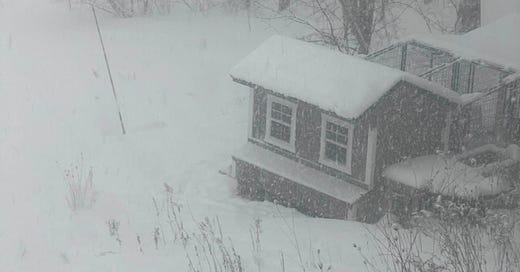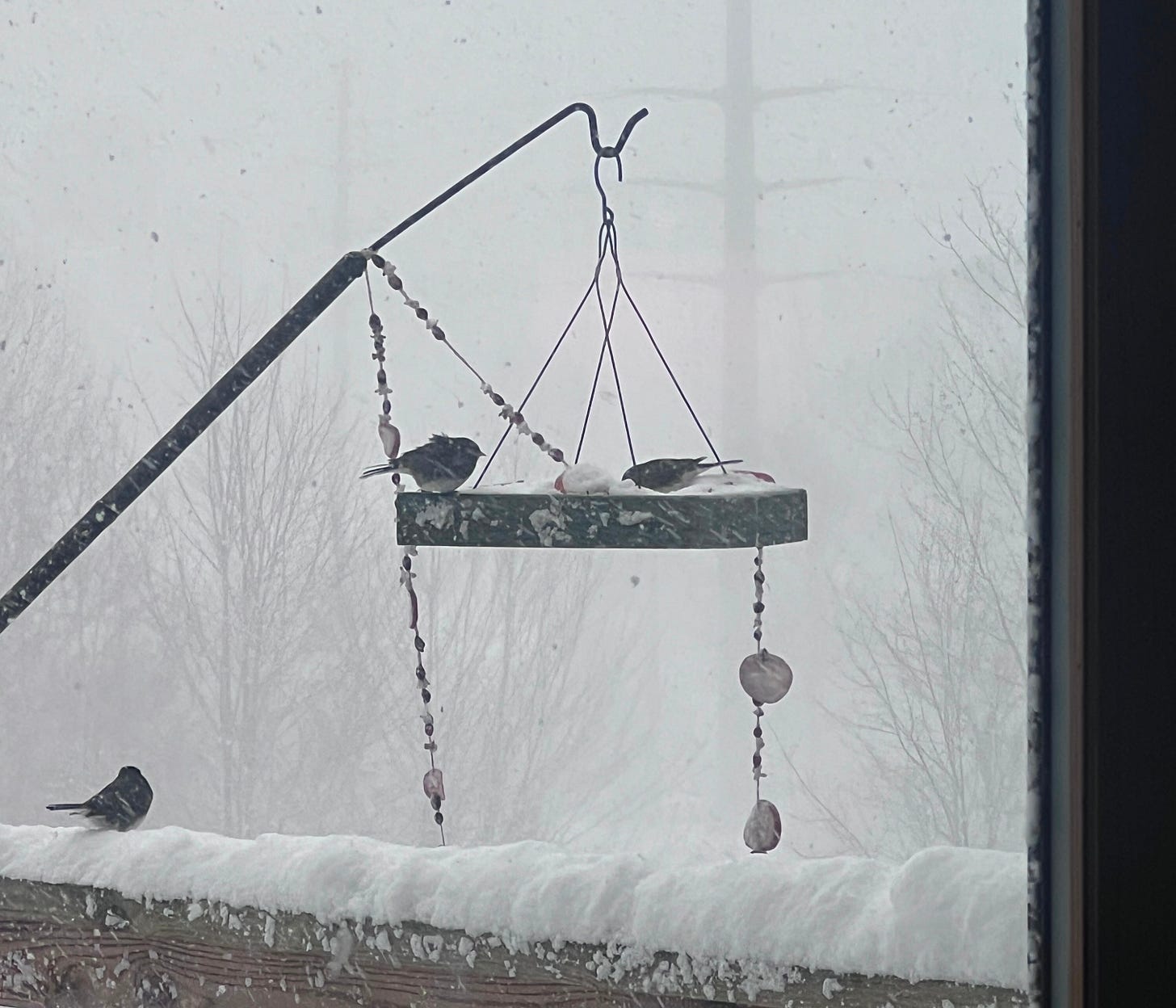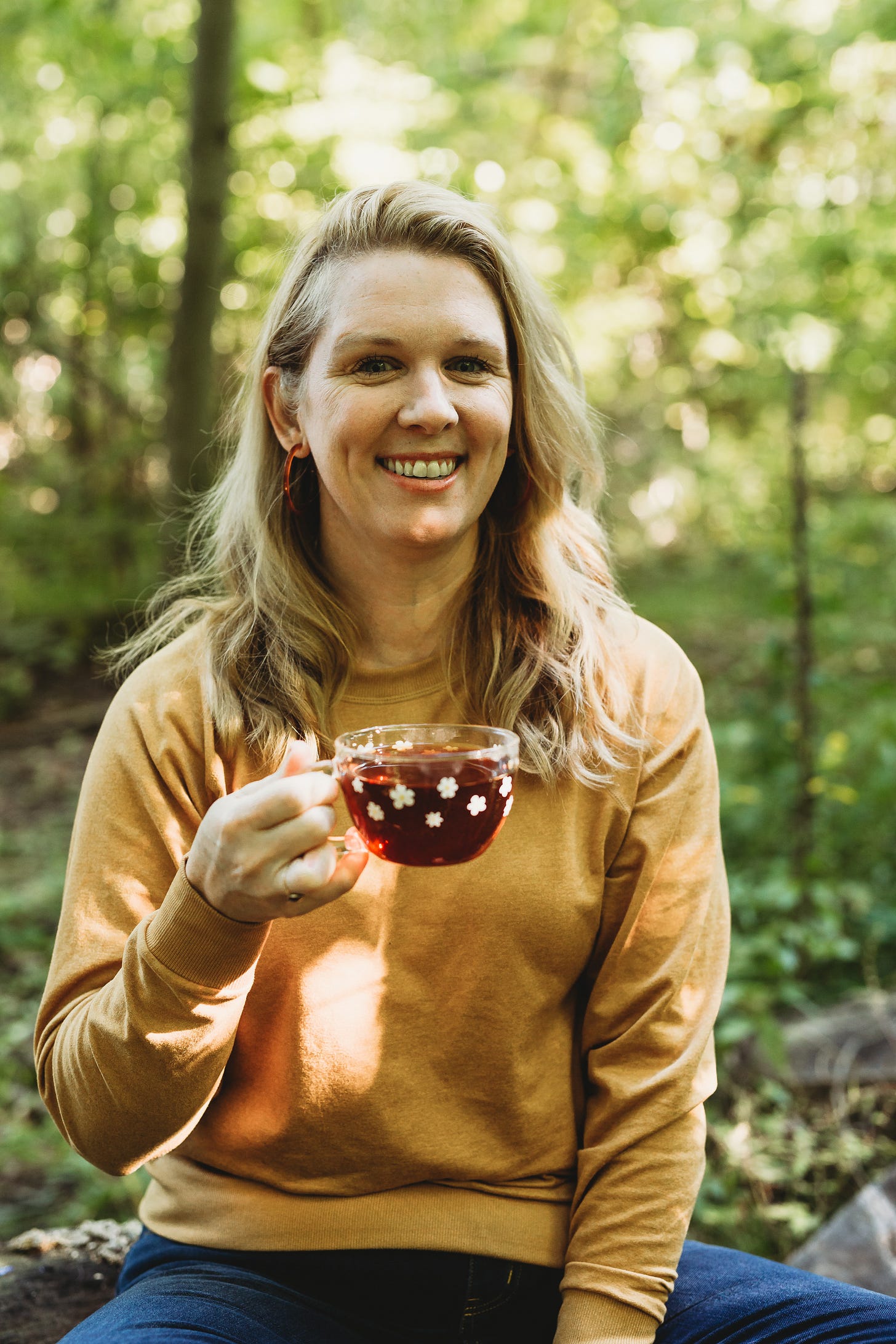I spent a lot of time last week caring for birds.
Our small flock of seven hens and one rooster live down the side of the hill from our home, in a spacious and secure enclosure Eric dubbed “Fort McChicken.” This isn’t my first winter with chickens, but it is my first winter with these particular chickens in this particular coop, and for much of last week, the weather was harsh.
We don’t have electricity run to the coop, so there’s no way to provide the flock with supplemental heat, but that’s not a huge problem in and of itself. Chickens, covered in warm layers of feathers, maintain a body heat of around 106 degrees Farenheit, and my little flock is made up of particularly cold-resistant breeds. Plus, with this year’s slow on-ramp to winter weather, they’ve had plenty of time to build up tolerance to low temps.
The bigger problem is water: without electricity in the coop, there’s been no way to efficiently keep their water thawed, and when it’s as cold as it was last week, fresh water - not to mention, those precious, precious eggs - very quickly freeze.
So for a few days, as the temps hovered around zero, I fell into a daily rhythm of bundling up and heading down to the coop every couple of hours or so to thaw out or replace the water, gather eggs, and to scatter grain into the coop to encourage the chickens to scratch up the bedding (as their poop mixes with the bedding it begins to break it down, turning into compost, which also helps to produce heat.)
As I worked, they made their little dinosaur noises, as if to say “Thanks for the drink. Now could you close the door already?”
With birds on the mind, once I got back to the house I’d go out to refill the feeder on our deck, which has been seeing a lot of activity.
Between trips to the coop and feeder, I spent a lot of the first half of last week tending to birds, both wild and domesticated. From a monetary return-on-investment standpoint it definitely wasn’t the most efficient use of my time—current egg prices notwithstanding.
And yet nothing about it had felt like time wasted. Scattering the food and thawing the water, collecting the eggs and cluck-clucking back to the hens, and filling the feeder for the population of cardinals and jays and woodpeckers and finches who frequent our deck, all felt like small but concrete ways to contribute to the upside-down world we all inhabit right now.
Tiny but useful, as Mary Oliver wrote in her essay “Upstream.”
The news is stressful and anxiety-inducing in this moment, and if you’re like me, reading other people fighting about the news is even more anxiety-inducing. Sometimes the world is simply a scary place - and while I try to keep a stiff upper lip and approach life with a spirit of optimism, the body keeps the score: I’ve been dealing with uncharacteristic neck pain, my sleep has been broken and fitful for the last few days, and I’ve even had a few really scary dreams.
It’s funny that, as my kids leave home and I find myself doing less active parenting, I’m not leaning into freedom from being needed quite as much as I once thought I might. Instead, providing small acts of care - feeding an animal, watering a plant, making a special treat for my spouse - are proving to be the opposite of draining: they fill my cup, helpfully redirecting my focus away from myself and my own fears while reminding me that I am not powerless; that I have the ability to do something that makes a difference for someone (or something) else.
You don’t have to have children (or chickens!) to give care. You don’t even, necessarily, have to take on an obligation like a pet or plant, though there is a lot to be said for longer-term commitments, too.
Caring can look like keeping on with the business of life; cooking and cleaning and car maintenance. It can start with the way we choose to engage with others, the way we present our own fears and anxieties to the world. Sometimes, I think, it begins simply with what we don’t do: restrain our most reactive urges, and build from there.
What does the world need from me right now? Is it less, or is it more? Is it speaking out, or is it creating space in silence? I’m still figuring this out, and I won’t always get it right. But tuning into small daily rhythms help me quiet the part of me that wants to simply lash out, so that a wiser voice has a chance to be heard.
These days I’m finding myself eager to lean into that voice. Small, simple acts of care - kneading the dough, steeping the tea, collecting the eggs, scattering the grain - seem to quiet my mind enough to hear that deeper wisdom. I’m listening. I care.
About me:
Hi! I’m Meagan, an author, podcaster, and midlife mom of five (mostly grown) kids. Here at The Kettle, I share my thoughts on how to live wisely and well in a manic modern world, and I look forward to hearing yours. If you want to connect more deeply, the private chat is open to paid members. I’m looking forward to getting to know you!








I never thought about putting grain in the coop with them on their straw! I'll have to try that next week -- temps are supposed to plummet here.
I read a news article yesterday and am now awake way too early on a Saturday morning because I've had nightmares all night long that wove in details of what I read in the article, and details of what's going on in the world right now. SIGH. This is why I don't watch/read through news anymore. I haven't read any news since the election, and I broke my no-news rule the other day because a friend is affected by the federal cuts and I wanted to read up on things in order to support her better. But, in doing that, I ended up screwing my subconscious over. I put my "no news" barrier in place for a reason; I should stick to it. That's my self-care, among other things. I, too, have been obsessively refilling my bird feeders and tapping on my Merlin Bird ID app more than usual this past week. I think I'll stick to that. 👍